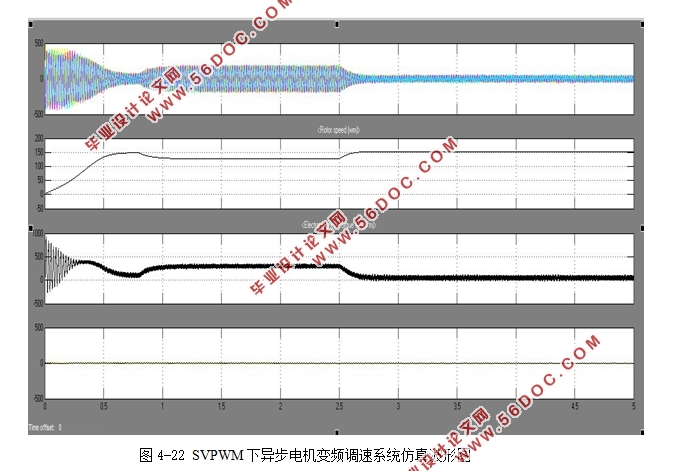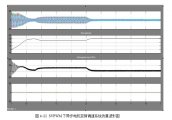基于SVPWM的异步电机变频调速系统设计与仿真研究(MATLAB,Simulink)(论文说明书16000字,仿真模型)
摘 要
本文首先介绍了电机调速技术和控制策略的发展概况以及国内外的研究现状,详细论述了异步电机的工作原理及其运行特性、矢量控制策略、坐标变换等理论,对异步电机的建模进行了分析,并利用MATLAB/Simulink系统实现了它的仿真分析。
其次,本文对空间电压矢量脉宽调制(SVPWM)的基本原理及控制方式进行了详细研究,分析了功率因数与电机各项参数以及运行条件的关系。重点基于MATLAB/Simulink进行异步电机SVPWM控制系统仿真,研究了异步电机变频调速系统的稳态特性、动态特性、以及系统参数变化等因素对系统性能的影响。在此基础上,利用MATLAB/Simulink搭建SVPWM逆变器供电下异步电机调速系统仿真模型。
最后,在前述理论的基础上,实现了基于SVPWM原理的变频调速,实现了SVPWM控制器的设计及优化,通过仿真分析异步电机调速特性,提出相关问题的解决办法或改进措施,达到了本课题研究的预期效果。并对该调速系统控制策略今后的发展提出了自己的看法。
关键词:异步电机 矢量控制 SVPWM MATLAB/Simulink仿真
Study of asynchronous motor frequency control system design and simulation based on SVPWM
Abstract
This paper first introduces the current research on the development of motor control technology and control strategy at home and abroad, discusses in detail the working principle and characteristics, induction motor vector control strategy, coordinate transformation theory ,modeling of induction motor are analyzed and the use of MATLAB/Simulink system to accomplish the simulation analysis.
Secondly, based on the voltage space vector pulse width modulation (SVPWM) of the basic principle and control method are studied in detail, analyze the relationship between the power factor and motor parameters and operating conditions. Focusing on the system simulation based on SVPWM control of induction motor MATLAB/Simulink, to study the influence of the steady state characteristic of asynchronous motor, the dynamic characteristics of the system, as well as the system parameters change and other factors on the performance of the system. On this basis, using MATLAB/Simulink to build the simulation model of induction motor fed by SVPWM.
Finally, on the basis of the foregoing theory, we realize the variable frequency speed regulation system which is based on SVPWM. Also ,the design and optimization of SVPWM controller, speed characteristics of asynchronous motor by simulation analysis are promoted. Then, we put forward relevant solutions to the problems and improvement measures, we successfully achieved the expected effect, and put the expected effect, after this, we put forward our views on the development of the control strategy of this system in the future.
Keywords: Asynchronous motor;Vector control;SVPWM;Simulation of MATLAB/Simulink

目 录
摘 要 I
Abstract II
目 录 III
第一章 绪论 1
1.1引言 1
1.2本课题研究的意义 1
1.3变频调速技术的发展与研究现状 2
1.3.1电机调速控制技术的发展 2
1.3.2 异步电机变频调速的发展 3
1.4控制策略的发展 4
1.4.1 PWM控制技术 4
1.4.2 SVPWM控制技术 4
1.4.3直接转矩控制 5
1.4.4模糊控制 5
1.4.5国内研究现状 5
1.4.6国外研究现状 6
1.5本课题研究的内容 7
第二章 异步电机的数学模型及调速方式 8
2.1异步电机的原理及特性 8
2.1.1异步电机的原理 8
2.1.2异步电机的特性 8
2.2坐标变换 9
2.3数学模型 12
2.3.1三相静止坐标系下的数学模型 12
2.3.2两相任意旋转坐标系下的数学模型(dq坐标系) 14
2.3.3两相静止坐标系下的数学模型(αβ坐标系) 15
2.4异步电机调速方式 16
2.4.1变极调速 16
2.4.2变转差率调速 17
2.4.3变频调速 17
2.5变频调速控制方式 18
2.5.1 恒压频比控制 18
2.5.2 矢量控制 18
2.5.3 直接转矩控制 18
第三章 电压空间矢量脉宽调制 20
3.1 PWM技术 20
3.2 SVPWM技术 20
3.2.1 电压空间矢量及逆变器模型分析 21
第四章 基于SVPWM的异步电机变频调速建模仿真与分析 25
4.1 SVPWM的实现 25
4.1.1确定电压空间矢量所在的扇区 25
4.1.2确定扇区的基本电压矢量作用时间 27
4.1.3电压矢量的作用顺序以及逆变器产生的PWM波形的确定 28
4.2 基于SVPWM的异步电机变频调速系统在MATLAB的仿真实现 28
4.2.1仿真模型的建立 28
4.2.2仿真结果分析 42
第五章 结束语 44
参考文献 45
致 谢 46
|



